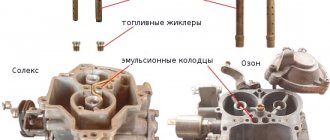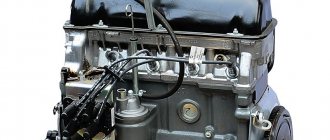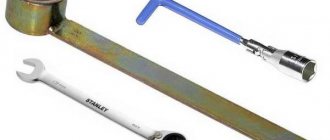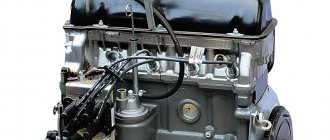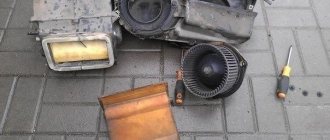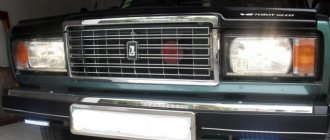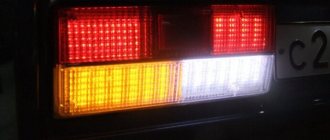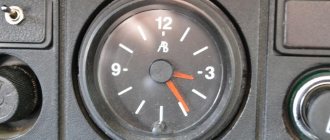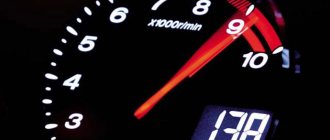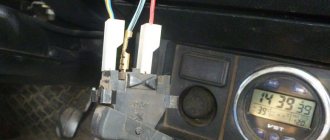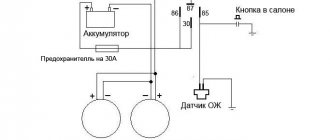On VAZ 2104, 2105, 2106, 2107 and 2108, 2109, 21099 (with a low panel) cars, an econometer is installed in the instrument panel (combination).
Let's try to understand why it is needed and how it works.
Why do you need an econometer on a car?
How does the econometer work?
The econometer works due to the vacuum in the intake manifold of a car engine, which occurs when the pistons move in the cylinders. This is a so-called vacuum gauge that measures the amount of vacuum. A tubular spring is installed inside it, which, when the pressure changes, either compresses or decompresses, moving the associated sector and the arrow of the device. The pressure difference is provided by a rubber tube connecting the econometric fitting and the fitting on the engine intake manifold.
How does an econometer work?
Using the VAZ 2109 car as an example, let’s look at how the econometer works. The device itself is installed in the instrument panel. It is connected to a fitting on the engine intake manifold. Using a rubber tube.
The tube is connected to the econometric fitting from the rear of the instrument cluster
The tube runs under the panel and goes into the engine compartment near the carburetor. There it is attached to a fitting in the intake manifold of the car engine.
The vacuum supply tube to the econometer is connected to the engine intake manifold
TWOKARBURATORS VK -More information on the topic in our VKontakte group
Classic VAZ cars with a carburetor engine were equipped with a device called an economizer. Diagnosing a malfunction and replacing this device with your own hands is quite simple.
Purpose of the economizer VAZ 2107
The full name of the economizer is forced idling economizer (EFS). From the name it is clear that its main function is to regulate the supply of fuel to the combustion chambers in idle mode.
The economizer allows you to save quite good fuel. This is especially true when driving on long descents, where the driver applies engine braking. At such moments, the EPHH does not allow fuel to enter the idle system. This, in turn, not only leads to a reduction in fuel consumption, but also increases traffic safety. The fact is that a car moving downhill in a low gear and constantly braking with the engine is much more stable on the road compared to a car freely rolling down the mountain at neutral speed.
Location of the economizer VAZ 2107
The VAZ 2107 economizer is located at the bottom of the carburetor next to the air filter.
Therefore, before dismantling the economizer, you will have to remove the air filter - there are no other ways to get to the EPHH.
Operating principle of the economizer
The VAZ 2107 economizer consists of:
- solenoid;
- shut-off actuator, made of plastic and performing the functions of a conventional needle valve;
- main idle jet.
If the accelerator pedal is not pressed and the crankshaft rotates at a speed below 2000 rpm, the EPHH is activated and shuts off the supply of the fuel mixture to the idle channel. The economizer is turned on when a signal is sent to it from the vehicle's control unit, connected to a microswitch in the ignition system.
When you press the gas pedal and the crankshaft rotation speed is above 2000 rpm, another signal is sent to the EPHH, turning it off, and the fuel supply to the idle channel is resumed.
Video: operation of the VAZ 2107 economizer
What does econ mean on a VAZ 2107 injector?
Unread message Andreys » Mon Mar 22, 2010 23:51:51
Unread message lazurko » Mon Mar 22, 2010 23:53:27
Unread message JET » Mon Mar 22, 2010 23:54:14
Unread message JET » Mon Mar 22, 2010 23:55:03
Unread message byran » Mon Mar 22, 2010 23:56:12
Unread message by VintoreZ » Mon Mar 22, 2010 23:56:34
Unread message JET » Mon Mar 22, 2010 23:59:26
Unread message byran » Tue Mar 23, 2010 0:00:01
Unread message JET » Tue Mar 23, 2010 0:02:43
Unread message byran » Tue Mar 23, 2010 0:22:35
Unread message JET » Tue Mar 23, 2010 0:38:43
Place the gasoline filter into the tube, which has a sump (shaped like the letter T), and change it as it fills with this guan. As I understand it, troubles occur only in the cold season?
Comrades MODERATORS, please change the word “economizer” to “econometer” in the topic title so as not to confuse the forum’s search engine and not to mislead less experienced forum members and guests.
Source
Signs of malfunction of the VAZ 2107 economizer
There are several typical symptoms of a faulty VAZ 2107 economizer:
- The engine is unstable at idle speed. The diaphragm in the carburetor loses its tightness, and the economizer needle valve begins to partially shut off the fuel supply.
- The engine starts with difficulty, even if it has not yet cooled down.
- Fuel consumption increases by about a third, and sometimes doubles. The latter occurs if the EPHH needle valve becomes completely clogged, hangs in the open position and stops shutting off the fuel supply in a timely manner.
- An increase in fuel consumption is accompanied by a strong decrease in engine power.
- Traces of gasoline splashes appear near the power mode economizer.
The appearance of one or more of these symptoms indicates a high probability of a malfunction of the economizer and the need to replace it.
General information about tuning the VAZ-2107 instrument panel
The VAZ 2107 is a model that has proven itself well on domestic roads. According to experts, tuning a VAZ 2107 with your own hands can completely change the appearance of the car and somewhat improve its operational capabilities. Today, there are all the necessary accessories and elements for tuning. Thanks to them, your simple factory panel can be turned into an attractive and practical “gadget” inside the cabin.
Tuning the VAZ 2022 panel can begin with installing good lighting. This will allow you to avoid straining your vision at night. But more on that a little later. In addition, you can improve this part of the car in another way.
Replacing the economizer VAZ 2107
To replace the VAZ 2107 economizer you will need:
- new economizer for VAZ 2107 produced by DAAZ;
- set of open-end wrenches;
- set of socket heads;
- flat screwdriver.
Sequence of work
Work to replace the VAZ 2107 EPHH is carried out in the following order.
- The engine is turned off and cools down for 15 minutes.
- The negative terminal is removed from the battery
- Use a 10mm socket to unscrew the air filter housing mounting bolts. The housing is carefully removed, allowing access to the carburetor.
Troubleshooting the unit
Upon completion of diagnostic operations on the VAZ 2107 engine, other breakdowns that may have similar manifestations should be excluded. The econometer works by changing the pressure in the carburetor channels; damage to its tube can lead to air leaks. A modern injector electronic control system eliminates electro-pneumatic devices that are less reliable.
An accurate determination of the cause of the EPHH malfunction is only possible if the unit is dismantled and completely disassembled. The economizer is removed from the carburetor in the following order:
- Using a “10” wrench, unscrew the 3 nuts holding the filter cover and lift it up along the studs.
- Unscrew two Phillips-head screws that secure the pneumatic block with the membrane and valve. The control tube is removed from the fitting of the device.
- The device is removed from the socket and carefully inspected for damage and carbon deposits on the valve or its seat.
The operation scheme of the carburetor, which was replaced by an injector, assumes a reaction to changes in pressure in the chamber with a decrease or increase in fuel supply. The economizer implements this feedback through a flexible membrane rigidly connected to the stem and valve. When checking this block, special attention should be paid to this node.
There are repair kits for sale for Solex carburetors that were previously installed on the VAZ 2107. The forced idle unit, if it does not work, can be repaired using parts from such a kit. Installation of the unit in its intended place must be accompanied by a leak test. The last thing to connect before installing the air filter is the econometer located on the control panel. The position of the arrow in the green sector indicates acceptable fuel consumption.
VAZ 2107 economizer sensor and its purpose
Car owners usually call an economizer sensor an econometer. Econometers of type 18.3806 were installed on the first carburetor VAZ 2107. These devices allowed the driver to estimate the approximate fuel consumption in different engine operating modes - at low speeds, at high speeds and at idle.
Economizer sensor location
The economizer sensor is located on the instrument panel above the steering column next to the speedometer. To dismantle it, simply remove the plastic panel covering the sensor.
Operating principle of the economizer sensor
The economizer sensor is a mechanical measuring device. It is a simple vacuum gauge that monitors the vacuum level inside the engine inlet pipe, since gasoline consumption is associated with this pipe.
The sensor scale is divided into three sectors:
- Red sector. The carburetor flaps are fully open. Fuel consumption is maximum (up to 14 liters per 100 km).
- Yellow sector. The carburetor flaps are approximately half open. Fuel consumption is average (9–10 liters per 100 km).
- Green sector. The carburetor flaps are almost completely closed. Fuel consumption is minimal (6–8 liters per 100 km).
The principle of operation of the sensor is quite simple. If the valves in the carburetor are almost closed, the vacuum in the intake pipe increases, gasoline consumption decreases, and the gauge needle goes into the green zone. If the engine operates at high speeds, the dampers open completely, the vacuum in the pipe reaches a minimum, gasoline consumption increases, and the gauge needle is in the red sector.
What is an econometer in the instrument panel?
On VAZ 2104, 2105, 2106, 2107 and 2108, 2109, 21099 (with a low panel) cars, an econometer is installed in the instrument panel (combination).
Let's try to understand why it is needed and how it works.
What is an econometric device in the instrument panel of VAZ cars?
— Why do you need an econometer on a car?
An econometer device is needed to visually determine fuel consumption by the driver in real time. But not exactly, but approximately - economically or uneconomically.
— How does the econometric device work?
The econometer works due to the vacuum in the intake manifold of a car engine, which occurs when the pistons move in the cylinders. This is a so-called vacuum gauge that measures the amount of vacuum. A tubular spring is installed inside it, which, when the pressure changes, either compresses or decompresses, moving the associated sector and the arrow of the device. The pressure difference is provided by a rubber tube connecting the econometric fitting and the fitting on the engine intake manifold.
The operating principle of the econometer is as follows: the less open the carburetor throttle valves, the higher the vacuum in the intake manifold, the less fuel the engine consumes, the econometer needle is at the end of the scale. And vice versa, the more the carburetor throttle valves are open, the lower the vacuum and the higher the fuel consumption - the econometric needle deviates to the beginning of the scale (yellow zone).
— How does an econometer work?
Using the VAZ 2109 car as an example, let’s look at how the econometer works. The device itself is installed in the instrument panel. It is connected to a fitting on the engine intake manifold. Using a rubber tube.
The tube is connected to the econometric fitting from the rear of the instrument cluster
The tube runs under the panel and goes into the engine compartment near the carburetor. There it is attached to a fitting in the intake manifold of the car engine.
The vacuum supply tube to the econometer is connected to the engine intake manifold
Source
Signs of a malfunction of the VAZ 2107 economizer sensor
Failure of the economizer sensor can be determined by two signs:
- the sensor needle went into the red zone and stopped moving;
- the sensor arrow reached the center of the yellow zone, stopped and began to twitch, not responding to changes in the crankshaft rotation speed.
This behavior of the needle is due to the fact that the teeth on the sensor tube are completely worn out or broken. The sensor needs to be replaced. It cannot be repaired, since there are no spare parts for it on the market.
The VAZ 2107 dashboard does not light up: reasons
If the device on the seven stops activating, check the components.
- Corresponding fuse. The insert often burns out due to moisture or power surges in the on-board network.
- Next, the wiring is checked. Some pins may not fit well or touch adjacent terminals, causing shorts and shorts.
Tidy 2107 does not work
If, when you turn on the ignition when the car is cold, the car does not start and the shield does not respond, check the above points and additionally inspect the ignition switch cylinder. Usually in this place the contact burns out or the connections oxidize, which causes loss of ignition.
Highlight the mass damage. Wires may oxidize, resulting in loss of contact.
2107: the tidy does not light up, the starter turns
When the shield goes out or the light is dim, check the operation of the external lamps and the illumination of the car interior. When everything is in order, remove the device and check the contact groups of the module.
VAZ 2107: temperature sensor on the dashboard does not work
The element fails only in two cases.
- The sensor has failed.
- Module wiring is damaged.
Replacing the economizer sensor of a VAZ 2107
To replace the economizer sensor you will need:
- new sensor type 18.3806;
- flat blade screwdriver.
How to replace the economizer sensor
The panel that covers the sensor is quite fragile. Therefore, when dismantling it, you should not make much effort. The sensor is replaced according to the following algorithm:
- The panel above the economizer sensor is held on by four plastic latches. The tip of the screwdriver is carefully inserted into the slot above the sensor. Using a screwdriver as a lever, the panel is carefully pulled out until there is a quiet click, indicating that the latch has disengaged.
- Other latches are unfastened in a similar way. Access to the sensor is provided.
Thus, even an inexperienced car enthusiast can replace the forced idle economizer of a VAZ 2107. To do this, you just need to carefully follow the recommendations of specialists.
An economizer is a device that was previously installed on classic VAZ cars. Many drivers believed that this was a completely useless detail that only took up space on the instrument panel and distracted attention. But in fact, this is a useful device; if you slightly adjust your driving style based on its readings, you can reduce fuel consumption by at least 15%. And this is true, because this device monitors one of the most important parameters of engine operation, on which many of its characteristics depend. This is the vacuum in the intake manifold and the air flow directly related to it. That is, in fact, it is an ordinary vacuum gauge, a tube, which is connected to the intake manifold between the throttle valve and the intake valve.
The vacuum in the intake manifold depends on the load, throttle position and speed. If it increases, this indicates that the cylinders are less well filled with air, which means that less fuel is required to maintain a certain mixture composition. That is, by the vacuum in the intake manifold one can judge the fuel consumption. At idle speed with the throttle valve closed, the engine consumes a minimal amount of air. As soon as we open the throttle, air flow increases and the vacuum in the intake manifold drops. At this moment, the economizer needle begins to bow in the direction of increasing fuel consumption. The greater the air consumption and the load on the engine, the less vacuum there will be and, accordingly, the greater the fuel consumption.
If we drive a car uphill or pull a loaded trailer and select 4th gear, then the load on the engine and air consumption can be so great that the economizer needle goes into the red zone. But if we switch to a lower gear, the load will decrease, and the economizer will show us an increase in vacuum in the intake manifold, that is, the arrow will move in the direction of reducing fuel consumption. But of course, it is impossible to accurately determine what fuel consumption is using this device, because it does not take into account the vehicle speed and engine speed. But it is still possible to slightly adjust the consumption by changing the operating mode of the power unit.
In this article we will tell you in detail about the structure of this element of the car and describe in detail how you can repair it yourself.
What is this
The ECON climate control mode is designed to save fuel and get maximum power output from the engine. When you press a button, the climate system controls only the dampers, taking into account the air temperature outside the vehicle. In this case, the compressor turns off completely or goes into minimum operation mode.
When considering what the ECON button on the climate control is, it is worth knowing its location. As a rule, it is located at the bottom, top, left or right of the control unit. Most often it is located closer to the driver's seat for faster activation. Please note that the ECON key is not available in all cars with climate control.
What is an economizer and why is it needed?
The following types of forced idle economizers are used in cars of the domestic manufacturer VAZ:
EPHH allows excellent gas savings, especially when driving on uneven terrain. During long descents, it suspends the fuel supply through the idle system. This is how engine braking occurs.
This driving mode has a beneficial effect not only on the driver’s wallet, since fuel is consumed more slowly, but such driving is also much safer. After all, when driving on a descent, the car is more confident and safer compared to driving in neutral gear.
Forced idle speed economizer (EFH) - check and replacement
1. If the engine does not run or idles unsteadily, it is possible that, as a result of a leaky diaphragm, the economizer valve is completely or partially shutting off the fuel supply. To check, connect the vacuum supply hose (from the inlet pipeline to the electro-pneumatic valve) to the economizer fitting. Let's start the engine. If the engine starts to run stably, the economizer valve is working properly. If not, then its diaphragm is damaged (or the hose itself is leaking).
Forced idle economizer system (EFS): 1
— throttle valve drive lever; 2 - microswitch; 3 - economizer; 4 — mixture quantity screw; 5 — mounting block of relays and fuses; 6 - ignition relay; 7 — ignition switch; 8 — ignition coil; 9 — control unit for electro-pneumatic valve; 10 — electro-pneumatic valve; 11 — hoses; 12 — inlet pipeline; 13 — economizer valve needle
2. The economizer valve may be stuck in the open position and not shut off the fuel supply (in this case, increased fuel consumption is observed). In this case, the engine runs stably at idle. To check the valve, start the engine and, in idling mode, disconnect one of the wires from the solenoid valve terminals (see “Solenoid valve - checking and replacement”). If the engine continues to run, the economizer diaphragm may not be sealed (or the solenoid valve may be faulty). To check, we remove (see below) and inspect the diaphragm; if there are breaks or cracks, replace it.
EPHH device
An economizer is installed on top of the VAZ 2107 carburetor. It is located not far from the air filter and consists of a housing, a shut-off needle that blocks the fuel outlet from the idle system, connected to the diaphragm needle, and an adjusting screw for the “amount” of the fuel mixture.
It is the jet that stops the flow of fuel into the combustion chamber. He does this if 2 important conditions are met - the crankshaft speed exceeds 1800-2000 rpm and the driver’s foot does not affect the accelerator. The EPHH is controlled without human intervention, since its operation is regulated by a small controller connected to the ECU (electronic control unit).
Adjusting the DAAZ 1107010 carburetor - general requirements for the operation
The 2107 carburetor is adjusted according to the same principles as any other carburetor. The adjustment is carried out on the basis of standard calibration data, which contains all the parameters without which high-quality adjustment and tuning of the device is impossible. Experts advise performing these procedures at least once a year (some pros believe that adjustments and tuning should be carried out every six months if the car is used quite intensively).
Qualified carburetor maintenance consists of the following steps:
- thorough inspection of the device from the outside, cleaning and washing it;
- visual inspection of all units and components for wear;
- cleaning and washing the float, the idle system, the strainer (checking it for functionality, by the way, is required at least every 30 thousand kilometers of the “Seven”), the starting mechanism, and the jets.
After this, you can proceed directly to adjusting all of the above components.
Purpose of the economizer for carburetor power modes
EMR is necessary to saturate the combustible mixture through the carburetor. In this case, the throttle opens and the engine starts running at full speed. In this situation, the engine power increases significantly, plus there is an additional opportunity to increase speed.
Some users install an EMR economizer on the VAZ 2107 carburetor precisely to increase power. But they must be able to do this competently, since while driving the load on the engine increases, which, of course, can lead to engine failure.
The operating procedure of the economizer of power modes of the Solex carburetor
When the car engine is running, chamber throttle 1 remains closed at idle. Therefore, an area of low air pressure appears under the damper. The economizer inlet is open, so the vacuum region extends to the diaphragm inside the economizer. The spring is gradually pulled back in the direction of the housing cover of the EPHH VAZ 2107. At this stage, the ball valve is closed.
After the driver presses the gas pedal, the pressure on the back side of the diaphragm drops, causing the valve to open. Then the fuel from the float chamber enters the emulsion well passing through the nozzle. At this moment, the fuel substance is well enriched with oxygen, so the car is given significant acceleration.
All 2022 Solex economizers come into operation only when the gas pedal is fully depressed.
Causes related to the carburetor
Carburetor choke is not fully open
After the engine has warmed up, the choke handle should be recessed and the carburetor air damper should be fully open. The engine is warmed up using an enriched mixture, for which purpose the air damper is closed with the choke handle. If the damper is constantly closed, the fuel mixture is over-enriched, and this leads to an increase in the car’s appetite. The choke handle is recessed and the position of the air damper is checked. If it is not fully open, there is a malfunction; it is necessary to adjust the choke drive, or eliminate the jamming of the damper.
Air damper carburetor VAZ 2107
Idle air fuel nozzle holder or solenoid valve is loose
Valve XX VAZ 2107
Fuel enters the idle system through the nozzle; if it is not screwed in completely, additional fuel will bypass the nozzle, enriching the mixture. The idle system operates in all engine modes. And every time we press the gas pedal, we force the engine to suck in an extra portion of fuel, leading to excessive fuel consumption.
Float chamber needle valve leaking
Needle valve VAZ 2107
A working needle valve of the float mechanism should shut off the flow of fuel into the carburetor at a certain level necessary for normal engine operation. If this level is exceeded, the fuel mixture entering the engine will be over-rich. If the fuel valve does not cope with its task, the fuel level in the float chamber will increase, and with it the fuel consumption will increase. This may happen due to a trapped speck or a valve malfunction. Moreover, the flow of additional fuel into the float chamber may be insignificant and unnoticeable, but fuel consumption will increase by a liter or one and a half. Therefore, it is worth checking the functionality of the shut-off needle valve or replacing it with a known good one.
Larger diameter main metering system or idle system fuel jets installed
With an increased diameter of the fuel jets, the mixture entering the engine becomes richer. Therefore, it is necessary to check that the size of the installed jets corresponds to the calibration data established by the manufacturer according to the vehicle manual.
The air jets of the main metering system or the idle system are clogged
GDS jets VAZ 2107
Clogged air jets will result in a richer mixture formed by the carburetor. It is necessary to clean and blow out the jets.
System XX carburetor VAZ 2107
To clean the jets, it is necessary to use softer materials than the jet material, so as not to damage the latter (for example, copper wire).
Economizer malfunctions
Here are the main symptoms that may indicate that the economizer is not working correctly:
- Fuel consumption has increased;
- Unstable operation at idle;
- The power of the internal combustion engine (ICE) has decreased;
- A warm engine does not start the first time;
- Drops of the fuel mixture appeared in the economizer.
After tuning a VAZ 2107 car, many motorists notice an increase in fuel consumption. You need to understand that after installing the EMR, gasoline consumption may increase, and this is quite normal. And especially when the service life of the internal combustion engine exceeds 5-6 years.
The engine may be unstable at idle due to a malfunction in the control unit. Therefore, voltage is applied to the solenoid, and it is retracted accordingly, affecting the operation of the internal combustion engine. A clogged nozzle or idle channel may be to blame for incorrect engine operation, so it cannot fully pass the mixture.
How to use
With this in mind, the question arises of how to use ECON on Scania climate and other cars. After enabling this option, you can assume that cooling is no longer working. Therefore, the temperature inside the car cannot be lower than outside the car. As for the heater, it continues to function as usual.
What does it mean? If it is 22 degrees Celsius outside and 30 degrees in the car, after turning on the ECON button on the climate control, the shutters open and air from outside enters the vehicle. This happens until the temperature inside drops to the user-set 22 degrees. After this, air access from the street is blocked. As soon as the temperature inside increases above normal again, air access opens again.
Therefore, due to power reduction/compressor shutdown, the temperature in the vehicle cannot drop below street level. In this case, the driver achieves the following results:
- Return of original engine power.
- Fuel economy.
- Reducing noise levels.
- Reduced load on the battery due to less consumption from the compressor.
Service station workers note that you cannot drive with the air conditioning button constantly turned off. In this case, there is a high risk of damage to the stuffing box seals and the appearance of freon etching. It is advisable to use the ECON button in extreme cases, when there is little fuel left in the tank and there is still a long way to go. But in such cases, it’s probably easier to completely turn off the car’s climate control.
Now you know what the ECON inscription on climate control means, what it is, and what it is used for. In simple words, this is a key to turn off / switch to the minimum mode of the refrigeration unit. That is, a kind of analogue of lo/hi. At the same time, the climate system continues to work for heating (if necessary) or brings in air from the street to compare temperatures.
In the comments, tell us if there is such an option in your car, and how you use the ECON button on the climate control.
Diagnostics and repair of EPHH
Diagnosing a faulty economizer is not that difficult; you just need to understand how it works and the principle of operation of the economizer. In the future, you will be able to eliminate the main difficulties yourself.
You can replace the EPHH or clean the jet without dismantling the carburetor. The procedure is carried out as follows:
- Carefully remove the air filter.
- Disconnect the power wire from the economizer, after which it should be unscrewed from the housing.
- Remove the jet and thoroughly wash it in kerosene.
- Briefly connect the economizer to the battery. If the drive is more than 5 mm, this indicates normal operation of the device. Otherwise, it will have to be replaced with a new one.
Important!
All repair and diagnostic work must be carried out with a dry carburetor, that is, the fuel must be drained from it.
To independently diagnose a malfunction of the EMR injection VAZ 2107, we suggest you watch the video:
Device malfunctions and their manifestations
The stability of the engine operation depends on the serviceability of the EPHH, and the failure of this device leads to the following unpleasant consequences:
- Unstable engine idling: spontaneous increase or decrease in speed. In some cases, the power unit simply stalls.
- A sharp increase in gasoline consumption while driving, especially in urban mode.
- A faulty economizer unit, which is installed on the carburetor, does not allow the idle speed to be adjusted correctly.
- The ecometer does not provide correct readings.
The standard engine operation control circuit in this mode does not allow the slightest violation of the system's tightness or its clogging. The main reasons for the failure of this unit are cracks in the membrane or clogging of the channels with solid deposits resulting from the use of low-quality fuel.
Replacing the economizer
Before starting work, you should collect all the necessary tools, then the replacement process will go much faster. You can make the replacement yourself, just follow these instructions:
- The engine must cool down for an hour before you can proceed with replacement.
- Using a 10 mm wrench, unscrew all the bolts that secure the air filter cover.
- Next, take a size 8 wrench and use it to unscrew the main fixing bolts. You now have access to the economizer sensor and carburetor.
- Now disconnect the connector that powers the micro valve.
- Using a screwdriver, unscrew the 2 bolts securing the EPH sensor.
- Remove the hose from the fitting, then move it to the side (it is advisable to fix it so that it does not interfere in the future).
- There is a spring installed under the panel located behind the sensor. It must be removed carefully, otherwise it may jump out and get lost. After installing the economizer, the sensor and spring should be replaced, as they begin to work worse over time.
- Then the entire system is installed; video tutorials from experienced car enthusiasts will help you with this.
snyatie-paneli-vaz-210754.jpg
Removing the “tidy” of the presented car is carried out in the following sequence:
1. First, you need to prepare the car for operations (to do this, you should review the corresponding material called “Preparing the VAZ 2107 car for repair and maintenance”).
2. Then you need to disconnect the wire on the car from the negative terminal of the battery.
3. After this, use a screwdriver and carefully remove the handles from the stove control levers.
4. The next step is to unscrew the nut that secures the meter reset handle. We remove the nut together with the washer and push the handle into the space that is located behind the instrument panel.
5. Using a thin screwdriver, carefully pry and then remove the screw plug that secures the instrument panel.
6. Using a Phillips screwdriver, unscrew the fastening screw.
7. Carefully remove the “tidy” of the VAZ 2107.
8. Disconnect the cable after the union knurled nut of the car speedometer drive cable has been unscrewed.
9. After this, remove the vacuum supply hose from the econometric fitting.
10. Carefully disconnect the blocks (three colors) of the wiring harnesses.
11. Now you can remove the panel from the car. After this, you can safely perform the following operations:
-replace the backlight lamps;
-if necessary, replace the control lamps.
Installation of the “tidy” should be carried out in the opposite order of its removal.
Video installation of the EPHH system
If you decide to install an economizer on your car yourself, we suggest watching this video. From it you can understand how much work awaits you. We wish you success!
Hello everyone, recently somewhere a couple of days ago I noticed that when accelerating a car, the econometric needle goes into the red zone in all 4 gears, 5th I haven’t tried to accelerate anywhere in the city yet, when I go out of town I’ll definitely check how it performs on the highway at this time I checked everything under the hood for a moment, didn’t find any breaks, maybe the sensor itself is faulty? I went through a bunch of forums on repairing vases and didn’t find anything I needed...
Instrument panel of the domestic seven
The VAZ-2107 panel, like any other car, is equipped with only the most important indicators of the “life activity” of the vehicle.
Of course, there are few of them, but they are mandatory and should be known well. This will help you notice a problem in time. While driving, every professional driver looks at the dashboard every few minutes to assess the operation of the vehicle's systems. This will help him, if necessary, correct his own actions in time.
However, there are times when inexperienced drivers do not fully understand the meaning of the instrument panel sensors.
The most common emergency situations are the following:
- The oil pressure warning light comes on. In such a situation, you need to stop driving by turning off the engine. It is necessary to check the oil level. If it is insufficient, you should add oil and only then start the engine. It is possible that the hazard warning lights will remain on. In this case, it is necessary to turn off the engine again and find a way to transport the car by tow to the place where the repair will be carried out. If you continue driving with the hazard warning light on, after a while the engine will “knock” due to the fact that the connecting rod bearings have rotated. If you continue to drive, the engine will jam. And in this situation, it will be necessary to carry out a major overhaul of the power unit.
- The battery warning light may come on. In this situation, you first need to check the terminals - perhaps they have oxidized and there is no reliable contact. If this does not help, then the problem is in the generator. It does not produce the required level of current to charge the battery. If the malfunction occurs during the daytime, it is better to try to get to the nearest service station. In this case, you need to turn off all electrical appliances. A high-quality battery in such conditions will “last” 100 or even more kilometers (the energy will only go to power the ignition system). Most often, in such situations, the voltage regulator relay fails.
- If the brake fluid warning light comes on, you should stop immediately. Driving without brakes is always a dangerous activity; this is not an extreme sport, but a normal safety precaution. If such a malfunction occurs, check the brake fluid level and, if necessary, add it. If the car can slow down, you need to try to slowly get to the nearest service station. If things are such that the car does not react, that is, does not brake, it is better to call a mechanic or, if you know how, eliminate the cause of the breakdown yourself.
- The sensor that shows the coolant temperature is “placed” in the red zone. The “classic” does not have a special alarm system that informs the driver about the “boiling” of the engine. Therefore, an inexperienced driver can easily “sleep through” such a moment (but it is very difficult not to notice the steam from under the hood). In such a situation, you need to stop and let the engine cool. You don't need to go under the hood right away. You may get severely burned. When the engine has cooled down, check the coolant level. If there is no break in the pipe of the coolant mechanism, then you need to try to get to a service station or garage and find out there why the temperature has increased. Most often this happens due to a thermostat failure or the radiator fan not turning on.
- The sensor that signals the fuel level is at zero. If there are less than five liters of gasoline in the gas tank, then the warning light will come on. In this situation, you need to refuel.
While driving, you should always pay attention to the tachometer readings. The speed of the power unit should not be higher than 5000 rpm. An experienced driver tries to keep the arrow in the green zone. Thus, an economical mode of vehicle movement is ensured.
